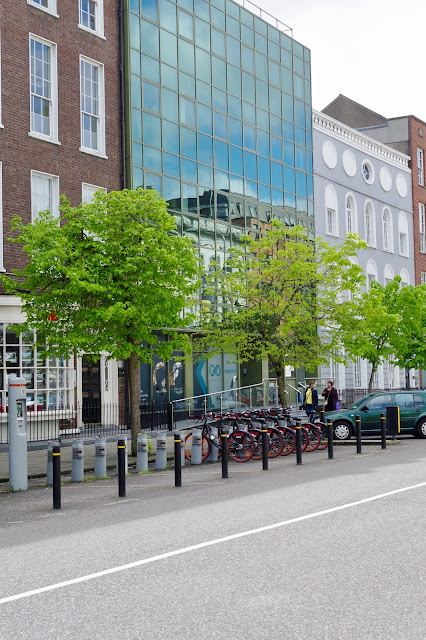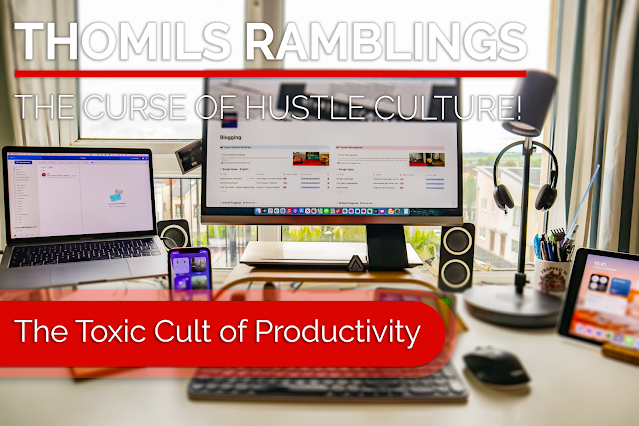As I look back at my professional life so far, all twenty years of it, there’s been one underlying if somewhat unspoken expectation that underpinned all of it. That is that you should work as hard as you possibly can, not just in your day job, but that you should ideally also have at least one side gig to be successful, one that you invest just as much energy and time into as in your day job. Sleep, recreation, a social life, pastimes, all these are seen at best as unwelcome distractions or weaknesses, and at best as equally unwelcome necessities to get inspiration and energy for your job. Thankfully, this mindset didn’t extend within my family, back when I still had a family, but still, it was always present in many of my jobs.
This attitude has a name, “Hustle Culture”. This term refers to a mindset that extols hard work to the detriment of all other aspects of life in order to “make it big” as early as possible, whether that’s by quickly rising up the career ladder or rapidly amassing significant financial wealth. Insidiously, hustle culture links a person’s wealth and productivity to their worth as a person. Whilst I’m pretty sure that this attitude has always been around to one degree or another, it really kicked off from the 1980s onwards, reaching a fever-pitch with the tech & start-up mania of the early to mid 2000s and indeed right up to the last few years before the pandemic. It still seems very widespread within the tech world, where its proponents are celebrated almost as messianic figures.
 |
| A laptop and a mug of coffee are some of the symbols of today's work culture. |
But why is this problematic? Surely, there’s nothing wrong with working hard? Well, leaving the general problem that I have with any cult of personality to one side for a second, there is indeed nothing wrong with working hard and trying to do the best job you possibly can. There’s equally nothing wrong with having a side gig next to your main job. Hell, this blog is a side gig that I’ve been running alongside my day jobs for over ten years at this point. The problem with hustle culture is in its denigration of any activity that is not job-related and in its celebration of endless grind and long working hours. Let’s face it, our bodies aren’t designed for eighteen-hour workdays for weeks and weeks on end. We need a certain amount of sleep to function properly. The type of sleep deprivation that is so often celebrated by proponents of hustle culture can lead to a whole laundry list of other issues including, but not limited to hallucinations, memory degradation, irritability & manic episodes, seizures, depression and even suicide. There’s a reason why sleep deprivation is considered a form of torture in many jurisdictions around the world, or a form of “enhanced interrogation” if you’re American. Beyond that, we humans are also social creatures. We need interactions with people outside of work, we need events where work is not the main discussion topic and which have no other purpose other than socialising! Finally, the inevitable consequence of working too long without a decent chance to recover will inevitably lead to a burnout. As someone who has gone through a burnout twice before, I can tell you from personal experience that this is not fun at all!
And yet, despite all these hugely problematic aspects, hustle culture has seemingly crept into every single aspect of pop culture. It’s gotten to the point where certain proponents of this way of life have become genuine celebrities in their own right. Just look at the following that people like Elon Musk have gathered just in recent years. Co-Working Spaces are popping up like mushrooms whilst slogans like “Rise and Grind” have effectively turned into religious mantras for some people. Then there’s the tech space, with companies like Apple, Google Facebook and others setting up lavish offices, primarily to ensure that their staff stay in said offices for as long as possible.
 |
| Whether it's co-working spaces like the Republic of Work in Cork city,... |
 |
| ...posh office campuses like the Apple European HQ in Hollyhill,... |
 |
| ...or even just freshly refurbished break rooms like this one on the campus of a former employer of mine, all these do their part to bring work into seemingly every little crevice of life. |
It’s the latter part that I find particularly problematic. Over the last decade or so, many companies have tried to use the popularity of hustle culture to squeeze every bit of energy out of their staff. This is particularly perfidious when it comes to junior employees, those just out of college or otherwise starting their careers. This demographic often feels like they have something to prove anyway, so they are easily goaded into working unhealthy hours over extended periods, often simply due to a combination of social/peer pressure and the vague promise of a reward. Elon Musk is a prime example of this, and reports of unsafe work habits and unhealthy hours at his company, especially Tesla, are legion.
But there’s no need to hop across the pond. I experienced it myself during my time at Apple. Every year during major product launches, Apple would launch “overtime competitions”, where employees in the support teams were encouraged to work extra hours over an extended period of time, often weeks on end. When I say extra hours, I mean an unhealthy amount of hours, right up to, and in quite a few cases even beyond, the legal limits here in Ireland. And by “encouraged”, I mean that employees were expected to do so and a certain amount of hours was considered mandatory. Meanwhile, there were certain team managers who were more than happy to help their teams circumvent the legal limits I mentioned earlier. The consequences were obvious, with a large number of my colleagues, including myself, suffering multiple burnouts during their time at Apple, and often losing their jobs as a consequence.
Hell, even some of the biggest proponents of this mindset are definitely showing evidence of the negative effects of working endlessly long days. Just look at Elon Musks increasingly bizarre tweets and business decisions. He definitely seems to be losing both his focus and his grip on reality, with his statements regarding his planned acquisition of Twitter quite possibly crossing the line from mere shitposting to deliberately attempting to influence stock prices. He's already facing civil lawsuits as a result of this and I wouldn't be surprised if the SEC and FTC are taking a VERY close look at the situation!
And yet, this attitude still persists in many quarters. It is still seen by many people as something positive, something worth striving for. More importantly, a lot of companies, even beyond the tech space, see it as something worth exploiting, to the point where a whole ecosystem of services and tools available for those who want to optimise every single aspect of their lives, with the usual exploitative & guilt-trip based marketing to boot. There’s a future article in the works to address that particular issue.
Thankfully, a counter-movement seems to be developing to counter what has become utter insanity. I’m not talking about the “No Work” movement, which probably deserves an article on its own at some point. Rather, it appears that companies themselves are beginning to catch on that having their employees work twelve, fourteen or more hours a day is manifestly unhealthy. My own employer, a company that hardly tolerates slackers to put it mildly, has recently begun to focus more on ensuring that their staff have a certain work-life balance. It isn’t perfect, there are many departments that still need a lot of work in that regard but the very fact that senior management has realised that the “old” ways are unsustainable is already a massive step in the right direction. Now, it might be that the pandemic has forced a lot of people to reconsider their professional environment, to reevaluate their old ways, but there seems to be something more behind it. Especially since research has shown that longer working hours do not equal higher efficiency.
Now, as I said before, I personally have no problem with working hard, or even throwing in the occasional late night when the dreaded end-of-quarter crunch time approaches. And I’m not averse to the odd side hustle myself, the fact that you’re reading this is a testament to that. However, it’s an inescapable fact that we only have a certain, limited number of days in our lives and only a limited number of hours in each day. Given the scarcity of this most precious of resources, it seems to me like complete insanity to just expend most of our time just racing from task to task, job to job, burning ourselves out multiple times, only to realise at the end that we’ve been chasing a fleeting mirage. We’re not here to live just for work, work is simply a means to allow us to live and enjoy the time we have!

Comments
Post a Comment